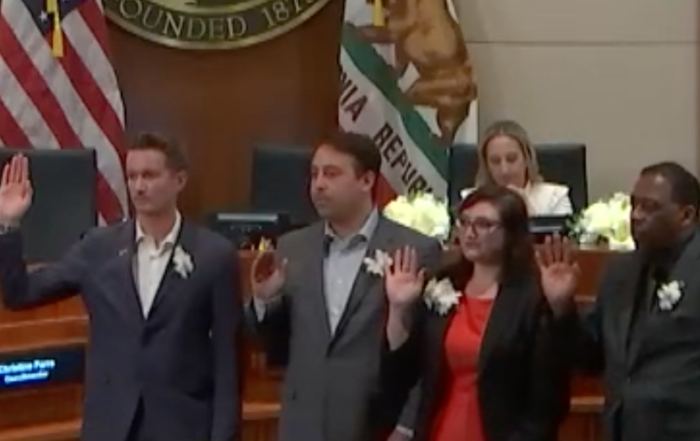The West Hollywood City Council took at least a temporary step Monday evening to ensure the number of affordable rental units is preserved as the city’s housing stock grows. Michelle Montenegro, from the Planning & Community Development Department, was on hand to present a proposed Zoning Text Amendment (ZTE) aligning replacement provisions for affordable units with state law.
The ZTE would apply replacement requirements for above lower-income units in new housing projects developed within city limits. The Amendment would require a one-for-one replacement of protected units at or above 80 percent of median income specifically when older buildings are demolished or altered to make room for newer rental properties or above lower-income tenants.
The protected units in question are designated as such if they fall within at least one of four categories:
- They are subject to an affordability restriction
- They are occupied by low or low-income residents
- Are subject to any rent or price control
- Are units that were withdrawn as rental properties through the Ellis Act
The move was spurred by State Legislation. Specifically, Assembly Bills 2222 (2014) and 2556 (2016), which, according to the staff report, state that “A proposed housing development project receiving a density bonus would, at the very least, maintain the number and proportion of affordable housing units as the existing development.”
AB 2556 also gave jurisdictions a choice of how units could be replaced. They could:
- Return as a unit with an affordability restriction for 55 years
- Come online as a rent-stabilized unit beginning at the current market rate
A 2019 law, Senate Bill 330, expanded one-for-one replacement projects beyond buildings that accepted a state density bonus and included any new housing project that affected existing protected units. It also included relocation benefits for tenants.
But in 2022, the city council limited the total number of deed-restricted affordable units in a building to 35 percent, despite having the authority as a rent-control jurisdiction to demand 100 percent deed-restricted replacement. All remaining units would be rent-stabilized beginning at market rate. This move, then opposed by Councilmember Lauren Meister, was questioned by her again on Monday evening.
Noting that 35 percent is the ceiling, she asked, “Under what circumstances could that number be less than 35 percent?” Montenegro responded that a feasibility study would still need to be completed to determine that answer.
“It seems like the amendment is necessary for us to be in compliance with state law, so, it’s something that we have to do,” said Councilmember John Heilman before asking what the estimated wait time would be for the feasibility study could be completed. Montenegro indicated another two to three months.
“I think we all want to maximize the number of affordable units that we get, but I think having that study completed is very important because we don’t want to have affordability requirements that make these projects unfeasible,” Heilman said. “From a development standpoint, if we have so many requirements, no housing will be built at all.”
But Meister again went at the intent of state law, reminding staff and colleagues that it gave rent-jurisdiction cities the right to capture as much deed-restricted affordability as possible.
“The reason the Planning Commission in 2019 voted unanimously for the 100 percent affordable is because they realized that rent-stabilized units aren’t necessarily affordable, especially when, today, those rents are starting at $2,500, $3,000, $3,500, $4,000 a month.” She thinks her colleagues and staff should at least consider 50 percent of all units in a building versus the 35 percent.
Councilmember Chelsea Byers inquired where the 35 percent number even came from, to which staff said may have been a compromise number last year among councilmembers. But Mayor Sepi Shyne recalled that it was a number given to the council at the time as a starting point until a feasibility study could be conducted.
Heilman said he would be willing to consider Meister’s suggestion, but not before the feasibility study is completed. “Playing around with housing policy without that information is very dangerous and could result in unintended consequences.” He ultimately moved the item forward with an understanding that another public hearing would be called to make any potential changes or specificity prompted by the results of the study.
As council and staff tried for clarity on the motion’s language, even City Attorney Lauren Langer admitted, “It’s a complicated concept – all of this replacement – so we could probably make it even better. The resolution was done to get something in place.”
The motion passed, 4-1, with Meister voting no. The feasibility study will be received by the city council as a consent item, be heard by the Planning Commission, and return to the council for potential adjustments in January.
Photo/Image by Yuri Tkach
Stay informed. Sign up for The Westside Voice Newsletter
By clicking submit, you agree to share your email address with Westside Voice. We do not sell or share your information with anyone.








